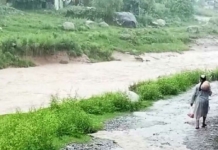The court inquiry into the advocacy for the Iran-Pakistan gas pipeline has sparked deliberations regarding freedom of expression and legal implications.
During the proceedings, the court questioned whether advocating for the construction of the pipeline could lead to imprisonment, raising concerns about the interpretation of laws and individual rights.
In response to inquiries regarding the deciphering of encoded messages, the court emphasized the prosecution’s responsibility to substantiate claims.
Chief Justice Amir Farooq scheduled further arguments for April 2, underscoring the significance of the case and the need for thorough examination.
The court’s inquiry into the advocacy for the Iran-Pakistan gas pipeline has prompted discussions on the boundaries of freedom of speech and the potential legal ramifications associated with expressing certain views.
The proceedings highlighted the need for clarity regarding the interpretation and enforcement of laws pertaining to national interests and security concerns.
Additionally, the court’s emphasis on the prosecution’s burden of proof underscores the importance of evidence-based legal proceedings and the principle of innocent until proven guilty.







